|
BLOW YOUR RIGHTS
Paying to have yourself beaten up.
The late, great Bill Hicks once
bemoaned the media coverage of America's ill-fated "War On Drugs",
not on the basis of the hysterical and wildly-counterproductive
campaign itself, but on the grounds of the lack of balance. Where,
he asked, were the positive drugs stories? Where were all the
people who used recreational drugs, didn't kill anyone, didn't rob
anyone, didn't rape anyone, and who just had a great time and then
went on with their lives?
The issue of balance in news reporting
is one that's never been more under threat than it is today. With
huge chunks of the media owned by a tiny number of individuals, with
"embedded" journalists serving as censored mouthpieces for the
military in war zones (and non-"embedded" ones liable to being
"accidentally" shot by that same military with slightly disturbing
frequency), and with governments doing their best to intimidate
reporters out of discovering the truth by exerting intolerable
pressure on broadcasters, it's becoming increasingly hard to hear
both sides of any story - especially where one side of the story has
corporate money behind it. Nowhere is this more true than on the
topic of piracy.
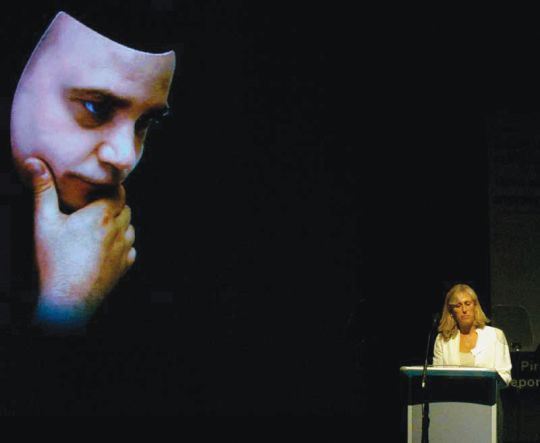
One of your reporter's favourite images from
the recent "DVD Piracy Is A
Crime" campaign.
Because pirates don't have a
representative trade body like
FACT or an industry-funded pressure group like the "Industry
Trust For IP Awareness", and because going and getting any kind of
counterpoint-type input to a story that doesn't involve having a
press release delivered directly onto your desk by an official
organisation is a bit too much like hard work for many modern
journalists, corporate bodies tend to get a pretty much free hand to
present any old cobblers they like as fact and have it repeated
verbatim as the truth by the media. Now, you might not think
that's much of a problem - after all, who cares if criminals aren't
having their side of the story given equal screen time to that of
the legitimate businesses and creators they're ripping off, right? -
but there are much wider issues at stake.
The leisure industry's attempts at
"educating" the public about piracy over the years have long been a
source of hilarity to intelligent consumers. The unforgettable "Don't
Copy That Floppy" has become a cultural icon, while ELSPA's run
of UK anti-piracy magazine ads in the
1990s is remembered with great fondness by the gamers of the time.
Both are so irredeemably naff that they probably did more to cement
the idea of copying games as being "cool" than any amount of piracy
could have. And let's not overlook this
superb radio ad from the Business Software Alliance, with its
chilling/side-splitting "young boy" voice.
The BSA, in fact, seem especially keen
to both use and target children in the War On Piracy. Their recent
competition to name its unwisely-judged anti-piracy ferret cartoon
character attracted a flood of
unhelpful
suggestions, and the organisation's "Play It Cyber-Safe"
campaign also brought a long-awaited
pair of
rivals to
"Don't Copy That Floppy", featuring the world's most unconvincing
"boy band" and a terrifying, un-named little girl
(pictured below) who, eerily like President George W. Bush, has one
giant eye and one normal one. The unfortunate child seems to have
no right arm, either.
(Note to BSA: Calling a video file
"young_girl.mpg" may bring your freakish starlet to the sort
of attention on the Internet that she'd probably rather not be the
focus of.)

"GRRRR! HULK SMASH PIRATES!"
But the undoubted comedy value of the
industry's anti-piracy initiatives also serves to distract attention
from the rather more sinister aims the ads represent. Because the
£1.5m so far spent on this most recent campaign alone is in truth
simply an attempt by massive corporations to buy changes in the laws
of the United Kingdom. This campaign isn't about crime, it's about
profits - and more specifically, about increasing those profits by
taking away basic consumer rights from legitimate purchasers.
Intellectual property laws have been
under sustained and determined assault by the major international
leisure conglomerates for several years now, whether in the fields
of music, film or games. Huge commercial pressure on weak,
business-owned politicians has already resulted in appallingly
unbalanced, draconian legislation like the USA's
Digital Millenium Copyright
Act and its European equivalent, the
European Union Copyright Directive.
These laws have already brought about serious and unjustifiable
losses of consumer rights
related to copyright material, but the leisure corporations aren't
finished yet. Flushed with these successes, they're keeping up the
pressure on their tame Senators, Congressmen and MPs, who are
obediently attempting to bring forth
laws
which will make the DMCA and EUCD
look like fluffy little
kittens
playing in a meadow full of daisies.
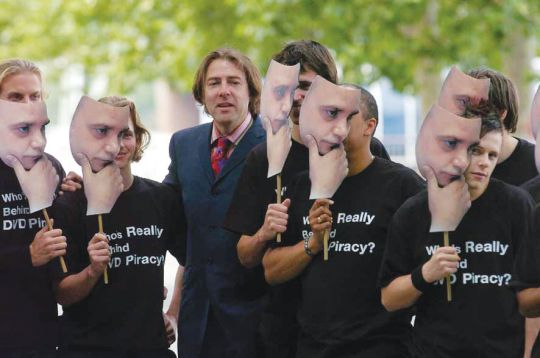
"Who Is Really Behind DVD Piracy?" Apparently,
it's some clean-cut, fresh-faced, happy young kids, working for
sinister criminal overlord and self-confessed DVD pirate Jonathan
Ross! Yikes!
The leisure corporations are
conducting, in fact, a war not against pirates, but on their
own customers. For many years now, honest consumers paying full
price for legitimate products have been saddled with crippled,
inferior versions of what the pirate users get for free:
- Pirate users
don't have to keep their
precious PC game discs spinning endlessly and noisily in the drive
(and being subjected to repeated handling)
while they play the game.
- Pirate users
don't have to
sit through all those infuriatingly long, unskippable splash screens /
trailers / adverts before they can watch the actual movie on their
new DVD, while the poor saps who paid for it in a shop do.
- Pirate users
don't get their brand-new music CD home only to find that it
won't play in their computer because it's been made in a
non-standard-compliant "anti-piracy" format which prevents
legitimate users from legally listening to music they've paid for.
- Pirate users can use their game
consoles to play games originating from any country, while
legitimate purchasers of, say, a game from Japan will be
unable
to play it on their legitimate, but UK-bought, Playstation 2.
- Pirate users don't have to
uninstall perfectly legal
software applications from their PCs, or put up with the secret
installation of
damaging
programs if they want to play their new games, unlike the
unfortunate legitimate consumers.
And so on. But astoundingly, the
entertainment business still doesn't think it's made life
miserable enough for its honest, paying customers.
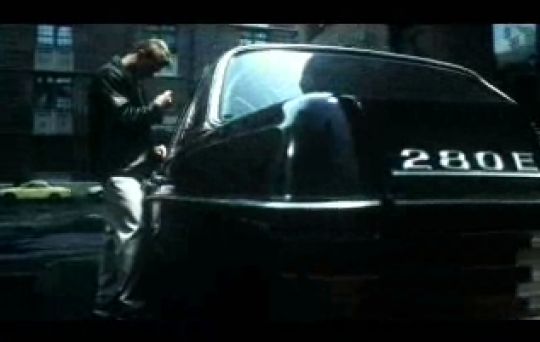
The new campaign's cinema advert (above)
bellows "YOU WOULDN'T STEAL A CAR" (or a handbag or a mobile phone,
apparently), wrongly equating the two
entirely separate crimes of piracy and theft. But neither will this
would-be car thief, who has stupidly forgotten his crowbar.
The industry is determined to make us
suffer still further, and what's more, they're prepared to
cheat,
distort, and
outright
lie in order to further this persecution - not
of pirates (who are and always have been essentially unstoppable)
but of the long-suffering
consumer.
Hold on, though. Why on Earth would they want to
do such a thing?
They want to do it because the giant leisure corporations have belatedly
realised, faced with a near-saturated market, that having consumers own the movies, music and
games that they buy is a far less lucrative business proposition
than merely renting them those same things on a pay-per-use
basis. (It's no coincidence that a large proportion of the
members of
the "Industry Trust for IP Awareness" - including Blockbuster,
Choices Video, Global Video and the British Video Association - are
movie-rental chains.)
These companies, both the retailers
and the publishers, hate the fact that once you've bought,
say, a music CD, you can then listen to it for the next 40 years
without ever having to pay them another penny. Accordingly, they are
desperate to downgrade consumer rights to such a degree that
"purchasers" will to all intents and purposes not be able to do
anything with their property without the corporations' explicit
authority and approval. From there, of course, it's only a tiny step
to having to pay a fee every time you watch / listen to / play it,
which is the entertainment industry's ultimate goal.
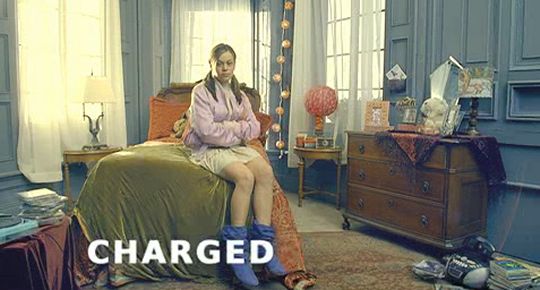
Apple used the most expensive advertising in
the world - that aired during the US Superbowl - to parade
schoolchildren convicted of illegal music downloading, and
coincidentally encourage sales for their restricted-use,
Digital
Rights Management-infected iTunes service at the same time.
The sort of hysterical
scaremongering whereby the fairly minor offence of DVD copying is
entirely spuriously
linked by
the entertainment business to
terrorism and murder and all manner of genuinely serious
crimes is nothing new for the industry when
it wants the law changed to protect or increase its members' profits, of course.
The President (until last year)
of the the movie industry's trade body the MPAA, the infamous Jack
Valenti, is a man long experienced in ludicrous,
borderline-psychotic dogma. In the 1980s, speaking for the movie
industry's attempt to outlaw the video recorder, he told the US
Congressional hearing that "The
VCR is to the American film producer and the American public as the
Boston Strangler is to the woman home alone." Tragically,
the MPAA's attempts at banning the VCR failed, and the entire US
movie industry was indeed utterly destroyed, in just the way Valenti
had warned. (SUB: PLEASE CHECK THIS.)
And let's not forget Jamie Kellner,
CEO of US giant Turner Broadcasting and the man who famously claimed
in 2002 that anyone who videotaped a TV show then fast-forwarded
through the adverts was a
thief. It may be worth keeping the deranged mindset of the
entertainment industry's figureheads - the people behind all the
campaigns we're discussing in this article, the people who get
richer every time you buy a DVD - in your thoughts the
next time you hear the industry lazily and untruthfully assert that
"piracy
is stealing".
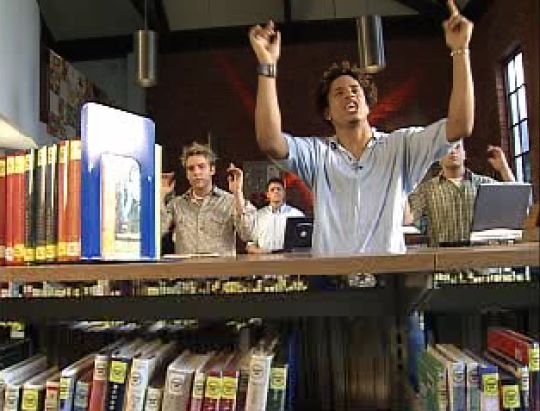
BOY-BAND LEADER: "Let's all praise Jesus and
the BSA for saving us from the evils of piracy!"
OTHER BOY-BAND MEMBERS: "Yay."
Of course, even if piracy WAS
stealing, which it isn't, implementing even more insanely-draconian laws wouldn't
make any difference. Pirates are unaffected by changes in the law
because as criminals, they - by definition - don't obey the law in
the first place. The only people who suffer from laws like the DMCA
and the EUCD and the proposed new acts are legitimate, paying
consumers like you and I, who are robbed of the right to protect our
investments (by making backup copies for when
fragile discs get damaged or worn out) and the right to enjoy
them in perfectly legal ways, such as transferring your CDs to an
iPod or similar digital player, or playing legitimately-bought
foreign games in your UK game console.
Which makes it all the more baffling
that media reports on absurd, dishonest and cynical attempts by
commercial vested interests to pervert the legislative process
almost never feature anyone putting the other side of the story.
It
becomes slightly less baffling when you notice that BBC
Worldwide is one of the members of "The Industry Trust For IP
Awareness Limited".
So let's just get this clear - a division of the BBC (an organisation of which
this website is a dedicated and committed ideological
supporter) is taking our money, for products (DVDs and videotapes of BBC programmes) which we were forced by law to fund the creation of, and is spending it on a political
campaign aimed at improving the profits of commercial organisations,
persecuting law-abiding citizens and lobbying the government to
erode consumer rights, on the basis of flatly
untrue propaganda. In other words, we're being forced by the law to subsidise the efforts of commercial companies to try to force the government to
destroy our civil rights. Huh?
Isn't there someone we can
write to about this sort of
thing?
|

